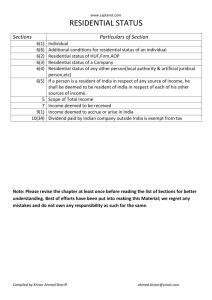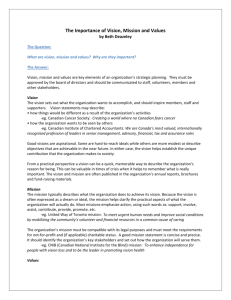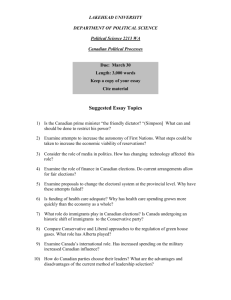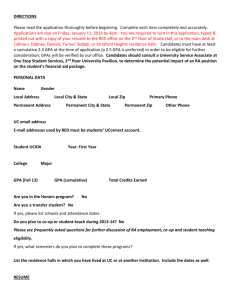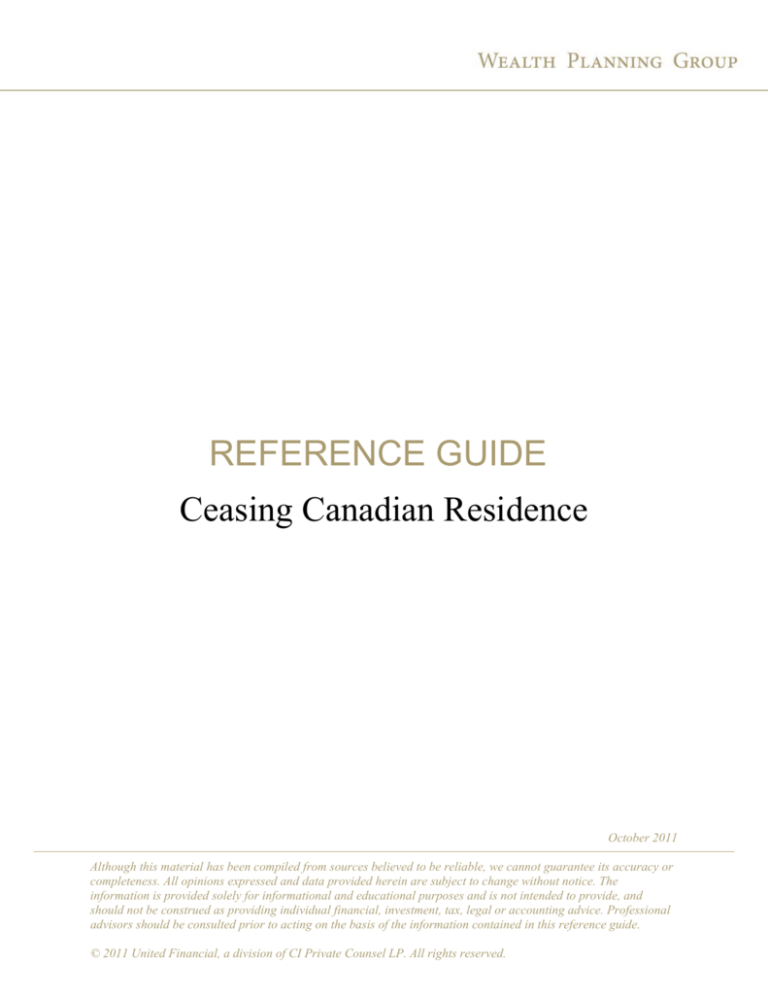
REFERENCE GUIDE
Ceasing Canadian Residence
October 2011
Although this material has been compiled from sources believed to be reliable, we cannot guarantee its accuracy or
completeness. All opinions expressed and data provided herein are subject to change without notice. The
information is provided solely for informational and educational purposes and is not intended to provide, and
should not be construed as providing individual financial, investment, tax, legal or accounting advice. Professional
advisors should be consulted prior to acting on the basis of the information contained in this reference guide.
© 2011 United Financial, a division of CI Private Counsel LP. All rights reserved.
A person who is resident in Canada during a taxation year is subject to Canadian income tax on
his or her worldwide income from all sources. A taxpayer who emigrates from Canada may be
subject to a tax upon ceasing to be resident in Canada (referred to as departure tax).
Following departure from Canada, a non-Canadian resident may be subject to Canadian tax on
Canadian source income. This may include employment income earned in Canada, income from
carrying on a business in Canada, taxable capital gains from the disposition of taxable Canadian
property and other Canadian source income such as interest, dividends, royalties, registered plan
withdrawals and Canadian trust distributions. Special rules apply for an individual who is
resident in Canada for only part of a taxation year.
Set forth below are general comments regarding tax consequences that may apply to an
individual ceasing Canadian residence. Special rules, which are not covered in this guide, may
apply where an entity other than an individual ceases to be resident in Canada.
Canadian residence
The term resident is not defined in Canadian income tax legislation. The Courts have held that
an individual is ordinarily resident in Canada for tax purposes if Canada is the place where the
individual, in the settled routine of his or her life, regularly, normally or customarily lives. In
making a determination of residence status (generally referred to as the factual residence), all of
the relevant facts in each case must be considered, including residential ties with Canada and
length of time, object, intention and continuity with respect to stays in Canada and abroad.
Apart from the factual residence, an individual may also be deemed to be resident in Canada or
deemed not to be resident in Canada in certain situations.
FACTUAL RESIDENCE
In determining whether or not an individual leaving Canada remains resident or ceases to be
resident in Canada for tax purposes, remaining residential ties with Canada while he or she is
abroad are considered. Unless an individual severs all significant residential ties with Canada
upon leaving Canada, the individual may continue to be a factual resident of Canada. The
residence status of an individual can only be determined on a case by case basis after taking into
consideration all of the relevant facts.
Useful information regarding various considerations that may be taken into account by the tax
authorities when determining whether or not a taxpayer has significant residential ties in Canada
for the purposes of the factual residency test can be found in the Canada Revenue Agency (CRA)
Interpretation Bulletin IT-221R3-(Consolidated), entitled “Determination of an Individual's
Residence Status”, dated October 14, 2002.
According to the CRA’s views, primary residential ties for the purposes of determining residence
status of an individual will generally include the following:
October 2011
© 2011 United Financial, a division of CI Private Counsel LP. All rights reserved.
1
•
Dwelling place or places (see IT-221R3-(Consolidated), par. 6):
“Where an individual who leaves Canada keeps a dwelling place in Canada (whether
owned or leased), available for his or her occupation, that dwelling place will be
considered to be a significant residential tie with Canada during the individual’s stay
abroad. However, if an individual leases a dwelling place located in Canada to a third
party on arm’s length terms and conditions, the CRA will take into account all of the
circumstances of the situation (including the relationship between the individual and the
third party, the real estate market at the time of the individual’s departure from Canada,
and the purpose of the stay abroad), and may not consider the dwelling place to be a
significant residential tie with Canada except when taken together with other residential
ties.”
•
Spouse or common-law partner or dependants (see IT-221R3-(Consolidated), par. 7):
“If an individual who is married or cohabiting with a common-law partner leaves Canada,
but his or her spouse or common-law partner remains in Canada, then that spouse or
common-law partner will usually be a significant residential tie with Canada during the
individual’s absence from Canada. Similarly, if an individual with dependants leaves
Canada, but his or her dependants remain behind, then those dependants will usually be
considered to be a significant residential tie with Canada while the individual is abroad.
Where an individual was living separate and apart from his or her spouse or common-law
partner prior to leaving Canada, by reason of a breakdown of their marriage or commonlaw partnership, that spouse or common-law partner will not be considered to be a
significant tie with Canada.”
Secondary residential ties must be looked at collectively in order to evaluate the significance of
any one such tie, so that a single secondary factor, taken in isolation, will not be determinative of
an individual’s residency in Canada while abroad. Secondary residential ties that will be taken
into account in determining the residence status of an individual while outside Canada include
the following (see IT-221R3-(Consolidated), par. 8):
•
personal property in Canada such as furniture, clothing, automobiles and recreational
vehicles
•
social ties with Canada such as memberships in Canadian recreational and religious
organizations
•
economic ties with Canada such as employment with a Canadian employer and active
involvement in a Canadian business, and Canadian bank accounts, retirement savings
plans, credit cards, and securities accounts
•
landed immigrant status or appropriate work permits in Canada
•
hospitalization and medical insurance coverage from a province or territory of Canada
October 2011
© 2011 United Financial, a division of CI Private Counsel LP. All rights reserved.
2
•
a driver’s license from a province or territory of Canada
•
a vehicle registered in a province or territory of Canada
•
a seasonal dwelling place in Canada or a leased dwelling place
•
a Canadian passport
•
memberships in Canadian unions or professional organizations.
The above list is not exhaustive, and various other considerations must also be taken into
account. Determination as to the date an individual leaving Canada becomes a non-resident is a
question of fact. Note that an individual who plans to leave Canada may consider submitting the
CRA’s Form NR73, Determination of Residency Status (Leaving Canada), in order to obtain the
CRA’s opinion on the individual’s residency status based on the information provided by the
individual.
DEEMED RESIDENCE
Apart from the factual residence, an individual may also be deemed, under the tax legislation, to
be resident in Canada in certain situations. This may include persons sojourning in Canada for a
total of 183 days or more in any calendar year and categories of persons specified in the tax
legislation such as members of the Canadian Forces.
DEEMED NON-RESIDENT
It should be noted that an individual who is a resident of Canada for tax purposes may also be a
resident of another country for tax purposes under the laws of the other country. In such a case,
the tax treaty between Canada and that country may provide tie breaker rules to determine in
which country the individual will be resident for purposes of the other provisions of the treaty.
If, at any time, such tie breaker rules apply and it is determined that an individual is a resident of
another country for purposes of a tax treaty between Canada and that country, then the individual
who is otherwise resident in Canada (whether factual or deemed) will be deemed not to be
resident in Canada at that time. Departure tax may apply in such circumstances where an
individual ceases to be resident in Canada under such deeming provisions.
Departure tax
Canadian tax legislation treats a taxpayer that ceases to be resident in Canada as having disposed
of his or her property for proceeds equal to fair market value. For individuals who emigrate from
Canada after October 1, 1996, the departure tax applies to all property, other than:
•
real property situated in Canada, a Canadian resource property or a timber resource
property
October 2011
© 2011 United Financial, a division of CI Private Counsel LP. All rights reserved.
3
•
property of a business carried on by the taxpayer, at the emigration time, through a
permanent establishment in Canada
•
property of a returning former resident who has elected to unwind the deemed disposition
on departure
•
an excluded right or interest (as defined below) of the taxpayer.
An excluded right or interest (excluded from the deemed disposition by individuals) is defined to
include:
•
rights under or an interest in a trust governed by a registered plan and other plans
providing specified pension and similar payments (including for example, RPPs, IPPs,
RRSPs, RRIFs, RESPs, RDSPs, TFSAs, DPSPs, and RCAs.)
•
certain rights under an employee benefit plan
•
stock option rights for shares of the employer corporation (or a related corporation) or
units of a mutual fund trust
•
a retiring allowance
•
rights under certain trusts such as an employee trust, an amateur athlete trust and an
eligible funeral arrangement
•
rights to benefits under the Canada Pension Plan, the Quebec Pension Plan, the Old Age
Security Act and the Saskatchewan Pension Plan and benefits under foreign social
security arrangements
•
interests in certain personal trusts resident in Canada
•
interest in certain non-resident testamentary trusts
•
interests in life insurance policies in Canada, other than certain interests in segregated
fund policies.
The departure tax will, therefore, apply to the following assets upon departure from Canada (this
list is not intended to be exhaustive):
•
real estate outside Canada
•
unincorporated businesses outside of Canada
•
private or public company shares in Canada or outside Canada
October 2011
© 2011 United Financial, a division of CI Private Counsel LP. All rights reserved.
4
•
mutual funds units in Canada or outside Canada
•
partnership interests
•
interests in non-resident inter vivos trusts
•
other portfolio investments
•
personal use property as well as listed personal property (such as works of art, jewelry,
stamps, coins, and rare manuscripts).
Security for departure tax
Departure tax could potentially pose a severe hardship to an individual, where there is a deemed
sale but no actual sale proceeds in connection with the assets subject to departure tax. An
individual is allowed to elect, on giving security acceptable to the tax authorities, to defer
payment of departure tax that is owing as a result of the deemed disposition of a particular
property until the property is actually disposed of. If such an election is made, interest does not
start to accrue on the amount secured until such time as the amount becomes unsecured and relief
is provided from penalties as they relate to the unpaid tax. The election has to be made in a
prescribed manner to defer the amount of the tax owing. The tax authorities will review the
amount of security on an annual basis and determine whether it continues to be adequate.
An individual is not required to furnish acceptable security for the first $100,000 of capital gains
as an individual is deemed to have furnished acceptable security for the tax on up to $50,000 of
taxable capital gains in the top tax bracket.
Information reporting
An individual who ceases Canadian residency must file with the tax authorities, in prescribed
form, a list of all the reportable properties that the individual owned at emigration time. This
reporting requirement only applies where an individual owns reportable properties at emigration
time having a fair market value greater than $25,000. Reportable property of an individual
includes most property other than:
•
money that is legal tender in Canada and deposits of such money
•
most (but not all) property that is an excluded right or interest defined above
•
any item of personal-use property the fair market value of which is less than $10,000.
October 2011
© 2011 United Financial, a division of CI Private Counsel LP. All rights reserved.
5
Planning for the departure tax
Potential departure tax exposure has to be determined at the appropriate time in light of all of the
facts. Planning strategies may be considered in certain circumstances prior to departure from
Canada. As well, planning strategies may be considered following departure from Canada. For
example, post-departure losses may, in certain circumstances, be carried back against deemed
gains from the date of emigration. Qualified professional assistance is highly advisable when
departure from Canada is considered.
Impact on Canadian planning strategies
Various tax planning strategies may be implemented in order to provide benefits to Canadian
resident taxpayers from a Canadian tax perspective. When a Canadian resident taxpayer is
considering ceasing Canadian residence in the future, Canadian departure tax considerations as
well as tax considerations in the new taxing jurisdiction after departure may significantly impact
on the advisability of implementing such planning strategies. Therefore, the opportunity to
implement Canadian tax planning strategies must be reviewed in light of an individual’s specific
future plans with respect to Canadian residency.
October 2011
© 2011 United Financial, a division of CI Private Counsel LP. All rights reserved.
6


